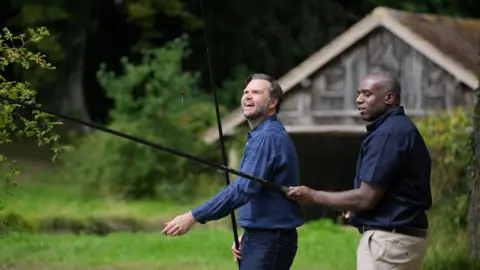Foreign Secretary David Lammy has recently come under scrutiny after admitting to fishing without a license during a trip with United States Vice President JD Vance. This incident took place at Chevening House, the official country residence of the UK Foreign Secretary, located in Sevenoaks, Kent. Lammy’s admission arises from what he has described as an “administrative error,” highlighting a lapse in judgment regarding fishing regulations that govern such recreational activities in England and Wales.
In response to the oversight, Lammy promptly contacted the Environment Agency to report the situation, taking steps to rectify his error by purchasing the necessary fishing license. The Environment Agency mandates that anyone aged 13 or older must possess a rod fishing license if they intend to fish for freshwater species. The failure to comply with this regulation can result in penalties, underscoring the importance of adhering to fishing laws for conservation and management of fish stocks.
During the fishing event last week, Lammy did not manage to catch any fish, while the vice president’s family reportedly did. Vance quipped at the beginning of their discussions about various international topics, including the ongoing situation in Gaza, that every member of his family successfully caught fish, with the exception of the British Foreign Secretary. It is noteworthy that all fish caught during the outing were released back into the private lake.
There has been some confusion regarding whether Vice President Vance secured a license for the fishing activity. The BBC has sought clarification from his spokesperson, though a response has yet to be provided. Meanwhile, the Foreign Office issued a statement detailing Lammy’s actions following the incident. They noted that Lammy communicated with the Environment Agency to acknowledge the lapse in obtaining the necessary licenses prior to the fishing trip and expressed gratitude for the agency’s efforts in protecting the UK’s fishing environment.
As a legal requirement, a one-day fishing license for trout and coarse fishing is available for £7.30, while severe violations can lead to fines reaching £2,500 and the potential seizure of fishing equipment. Earlier this year, for instance, six anglers in London were collectively fined £2,182 for various fishing violations, with Richard Tyner, the area fisheries team leader at the Environment Agency, emphasizing the seriousness of breaking fishing laws. The agency actively monitors fishing activities and prosecutes transgressors to uphold the integrity of fish populations and promote sustainable fishing practices.
The BBC reached out to the Environment Agency to inquire whether Lammy faced any penalties for his lapse in licensing. While no definitive answer has been provided, an agency spokesperson reiterated the necessity of a fishing license for individuals engaging in fishing activities as a means to preserve and enhance the conditions of rivers and lakes while supporting the sport that many anglers cherish.
In this case, Lammy’s public admission of his oversight highlights the critical need for individuals, particularly those in positions of authority, to be acutely aware of and comply with regulations that govern recreational activities like fishing. The incident has sparked discussions about the implications of fishing licenses and the responsibilities of anglers, which serve not only to regulate fishing but also to support conservation efforts. The overarching discourse is indicative of the often-overlooked details that can lead to significant accountability and how even minor oversights can garner considerable public attention, particularly in the context of international diplomacy and engagement.











